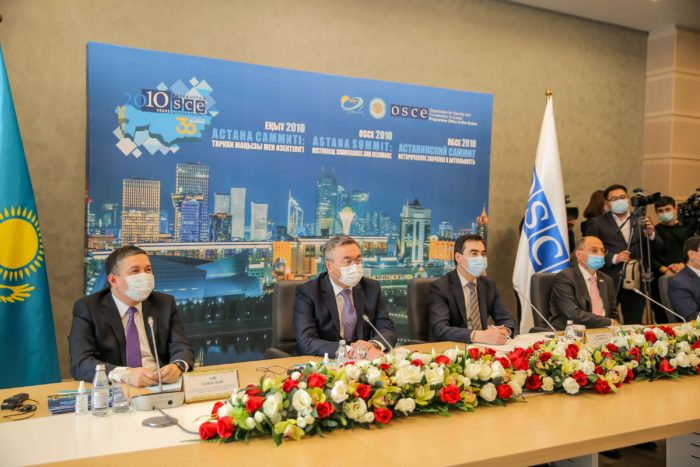NUR-SULTAN – Deputy Prime Minister – Minister of Foreign Affairs of Kazakhstan Mukhtar Tileuberdi, OSCE Chair Ann Linde and OSCE Secretary-General Helge Schmid opened an international conference commemorating the historical significance and relevance of the OSCE Summit hosted by Nur-Sultan (then Astana) in 2010 and the Astana Declaration.

L-R: Adviser to the First President of Kazakhstan- Head of department of informational and analytical support of Administrative Office of the First President of Kazakhstan Adil Tursunov, Deputy Prime Minister – Minister of Foreign Affairs of Kazakhstan Mukhtar Tileuberdi, Director of the Library of the First President of Kazakhstan Bakytzhan Temirbolat and Head of the OSCE Programme Office in Nur-Sultan György Szabó.
The event was organized by and held at the Library of the First President of Kazakhstan – Elbasy.
Kazakhstan was the first post-Soviet country to chair the organisation, a recognition of the increasing role of Kazakhstan in the international arena.
Since its independence, Kazakhstan has built strategic partnerships with the world’s leading countries and authored many important initiatives, including the Conference on Interaction and Confidence-Building Measures in Asia (CICA), said Tileuberdi.
“The global nuclear movement, the fight against international terrorism, the development of interconfessional dialogue and bringing the West and the Muslim world closer to each other. Regular meetings of the Congress of World leaders every three years in Nur-Sultan have become an important link in the dialogue between civilisations,” said the minister.
The 30th anniversary of the closure of the Semipalatinsk test site is yet another important milestone not only for Kazakhstan, but the world.
“In 1991, the world’s largest test site with an area equal to that of Italy was closed. The world’s fourth largest arsenal was abandoned,” he added.
The current global situation exacerbated by the ongoing coronavirus pandemic reiterates the relevance of the Astana declaration that reaffirmed a commitment to a “common and indivisible Euro-Atlantic and Eurasian security community stretching from Vancouver to Vladivostok.”
Tileuberdi suggested greater cooperation between the OSCE and CICA since they strive for common goals.
“We are entering an era of disconnectedness given the rise of national egoism, economic protectionism, and the factor of power in international relations. (…) The world community understands the need for a more sustainable system of international relations. Strengthening cooperation in the OSCE becomes ever important across these three dimensions, with a focus on the second one,” said Tileuberdi.
Through dialogue, inclusion and respect for agreed principles, the OSCE can make a real difference, said Chairperson-in-Office and Swedish Minister for Foreign Affairs Ann Linde.
“The Astana declaration is one of the prime examples of that and shows why our joint commitment remains so important,” she said in her video address to the conference.
She noted the importance of the summit hosted by the Kazakh capital, the first in over a decade and still the last to gather the OSCE member states.
“To remind ourselves that all OSCE principles and commitments without exception apply equally to each participating state and that we are all accountable for their full implementation. We need to continuously highlight why and how these commitments remain relevant and important today. This conference is an excellent example of how we can do that,” said Linde.
Security can only be achieved when there is equality between women and men, respect for democratic principles and the fulfilment of human rights, said Linde also elaborating on her country’s priorities as the organisation’s chair.
“Without genuine political will from those involved in conflicts, progress is, of course, hard to achieve. This is why defending European security order and its fundamental principle is the priority for the Swedish chairpersonship in the OSCE. It is essential that we build our organisation on principles and commitments agreed by all in order to achieve security for all. Two other priorities for our chairpersonship are to strengthen the comprehensive concept of security and contribute to solving the conflicts in the regions in accordance with the law. Our priorities are interlinked,” she said.
OSCE Secretary General Helge Schmid also spoke about Kazakhstan’s involvement with the OSCE.
“Kazakhstan and OSCE are closely connected in many ways. Since its membership in 1992, Kazakhstan has become one of the most active OSCE participating states taking initiatives and contributing to our security dialogue. A champion of the economic and environmental dimension Kazakhstan continues to provide significant impulses on many important topics, including connectivity and sustainable development,” said Schmid.
Kazakhstan’s good relations with other countries, both in the region and beyond, also play a crucial role in achieving the organisation’s goals, particularly amid the current geopolitical situation.
“Chairing of OSCE in 2010 and the Astana Summit was a high watermark in Kazakhstan’s involvement with the OSCE, taking on this important responsibility was a service to the organisation, but also furnished Kazakhstan’s reputation as a country with strong aspirations to act as a bridge between Europe and Asia. This bridge building function is even more important today,” said Schmid.
The Astana declaration, according to her, represented a “visionary political declaration.”
“This was the last time to date and the only time in the century that the OSCE participating states met at the highest level. (…) Even a decade ago, it was clear to me and all participants at this historic summit that for this vision to become reality, we would need to strengthen respect for OSCE fundamental principles and commitments, and step up our efforts to find common ground,” said Schmid.
The organisation needs to reflect on the current security situation and seek solutions for it to promote cooperative and comprehensive security for all.
But the path towards that goal is hindered by multiple factors, she said, including geopolitics and unilateralist tendencies that are “pushing in the opposite direction.”
“Unresolved long standings conflicts in our midst show how fragile the security continues to be in our region,” she said.
She stressed the point that the organisation offers “the best available platform” to address current challenges.
